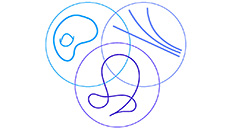Masterclass: Continuous K-theory, dualizable and rigid categories
University of Copenhagen
10-14 June, 2024
Press the picture or here for a bigger picture.
The masterclass aims to introduce the participants to new methods in, and applications of algebraic K-theory, based on Efimov's recent breakthroughs about dualizable categories and localizing motives. The masterclass will consist of three lecture series by Dustin Clausen, Alexander Efimov and Thomas Nikolaus, shedding light on different aspects of continuous K-theory, dualizable and rigid categories. This will be accompanied by informal discussion sessions in which the participants can discuss the material and exchange ideas.
Limited financial support will be available for some participants.
You can find recordings here.
There has been a joint effort from participants of the masterclass to tex the lectures and we wish to thank all the people involved in the project. The following notes are kindly offered to us by Claudius Heyer.
Dustin Clausen
Alexander Efimov
Thomas Nikolaus
Dustin Clausen:
Title: Three perspectives on Deligne cohomology
Abstract: Deligne cohomology is a refined cohomology theory for complex manifolds, known in number theory for its role both in Arakelov geometry and in Beilinson's conjectures on special values of L-functions. In these lectures I will describe three interrelated perspectives on Deligne cohomology. The first represents an attempt to determine for which kinds of "analytic spaces" the standard definition of Deligne cohomology makes sense and has good properties. The second and third, which describe theories only conjecturally equivalent to Deligne cohomology, represent attempts to articulate that Deligne cohomology is the complex-analytic analog of motivic cohomology. In the second, which is joint with with Peter Scholze, we define (using Efimov's continuous K-theory) a version of algebraic K-theory for analytic spaces and conjecture that it identifies with the (easily defined) K-theory analog of Deligne cohomology. In the third we more directly articulate a conjectural universal property for Deligne cohomology inspired by the recent "non-A^1-invariant motivic" formalism of Annala-Iwasa in the algebraic setting. The first and second perspectives make use of the theory of analytic geometry developed in joint work with Peter Scholze; we will review the necessary aspects of that theory.
Alexander Efimov:
Title: Dualizable categories and localizing motives
Abstract: I will give an introduction to dualizable categories and their localizing invariants. I will start with the general theory of dualizable categories, and explain some non-trivial results, such as equivalence between dualizability and flatness for a presentable stable category. Then we will compute the localizing invariants of various dualizable categories which come from topology and non-Archimedean analysis. These include sheaves on locally compact Hausdorff spaces and categories of nuclear modules on formal schemes. I will also explain a deep connection between the algebra of dualizable categories and the category of localizing motives -- the target of the universal finitary localizing invariant (of categories over some base). We will see that the category of localizing motives (considered as a symmetric monoidal category) is in fact rigid in the sense of Gaitsgory and Rozenblyum, and sketch some applications.
Thomas Nikolaus:
Title: Continuous K-Theory and Geometric Topology
Abstract: we will begin by providing equivalent characterizations of dualizable categories and describing various aspects of their general theory, complementing the courses of Clausen and Efimov. We will review Efimov's definition of K-Theory for such categories. Additionally, we will discuss the theory of (locally) rigid categories as developed by Gaitsgory and Rozenblyum, incorporating insights from Efimov, Clausen, and Ramzi. Finally, we will explain the application of this theory to geometric topology, particularly in the characterization of simple homotopy types. A key aspect is to describe assembly maps, inspired by similar descriptions given for operator algebras. This approach leads to new proofs of results by West and Chapman.
The lectures are held in HCØ, Universitetsparken 5, 2100 København Ø.
| Monday |
Tuesday |
Wednesday |
Thursday |
Friday |
|
Coffee |
Coffee |
|||
|
Registration |
Nikolaus-1 (Aud 5) 9:30-10:30 |
Coffee 10:00-11:00 |
Coffee 10:00-11:00 |
Efimov-6
|
|
Efimov-1 (Aud 4) 11:00-12:00 |
Efimov-3 (Aud 5) 11:00-12:00 |
Nikolaus-2 (Aud 5) 11:00-12:00 |
Nikolaus-3 (Aud 4) 11:00-12:00 |
Clausen-4 (Aud 4) 11:00-12:00 |
| Lunch 12:00-13:30 |
Lunch 12:30-14:00 |
Lunch 12:00-13:30 |
Lunch 12:00-13:30 |
Lunch 12:30-14:00 |
|
Clausen-1 (Aud5) 13:30-14:30 |
Discussion (Aud 4) 14:00-14:45 |
Efimov-4 (Aud 3) 13:30-14:30 |
Efimov-5 (Aud 5) 13:30-14:30 |
|
|
Coffee + cake 14:30-15:00 |
Coffee + cake 14:45-15:15 |
Coffee + cake 14:30-15:00 |
Coffee + cake 14:30-15:00 |
|
|
Efimov-2 (Aud5) 15:00-16:00 |
Discussion (Aud 4) 15:15-16:00 |
Clausen-2 (Aud 3) 15:00-16:00 |
Clausen-3 (Aud 5) 15:00-16:00 |
|
| Pizza reception (South End Main Hall) 18:00-20:00 |
Leave for Dinner 17:15 Dinner at (Food Club) Sortedam Dossering 7c 2200 København Ø 17:45-19:15 |
|||
The conference/masterclass will take place at the Department of Mathematical Sciences, University of Copenhagen. See detailed instructions on how to reach Copenhagen and the conference venue.
Tickets and passes for public transportation can be bought at the Copenhagen Airport and every train or metro station. You can find the DSB ticket office on your right-hand side as soon as you come out of the arrival area of the airport. DSB has an agreement with 7-Eleven, so many of their shops double as selling points for public transportation.
A journey planner in English is available.
More information on the "find us" webpage.
Registration has closed.
Qingyuan Bai qb@math.ku.dk
Maxime Ramzi ramzi@math.ku.dk
(if you need assistance wth travel document or invitation letter you can write to qb@math.ku.dk)


